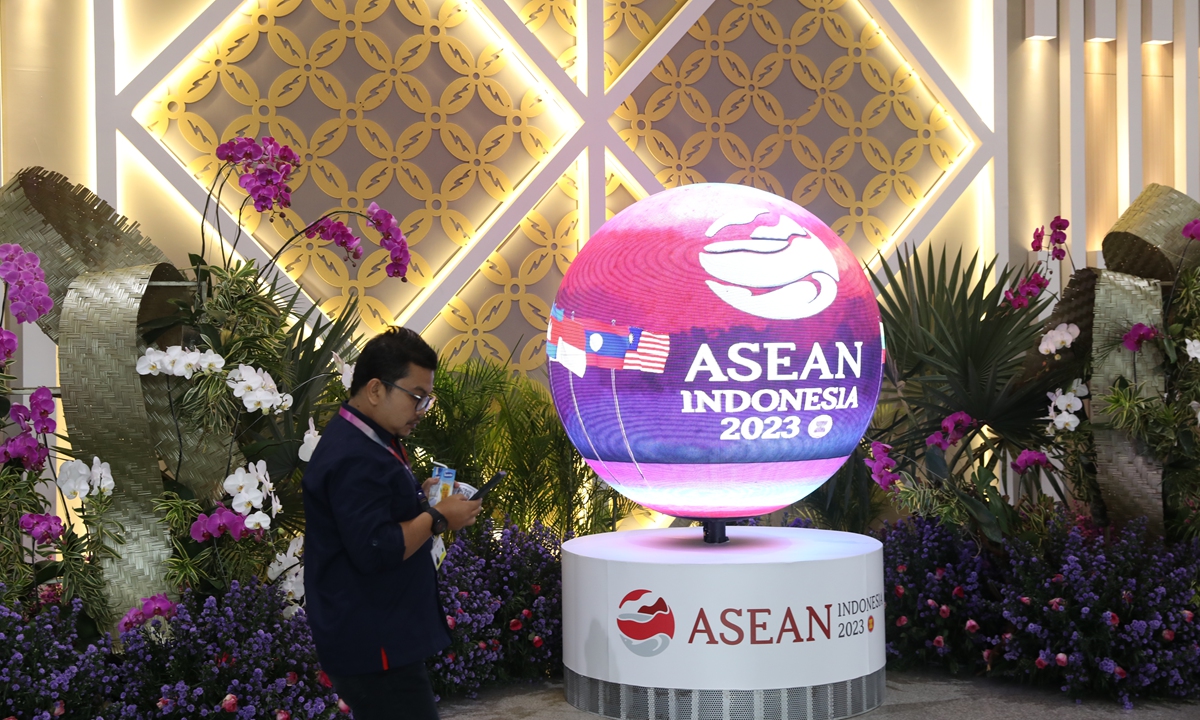
The 43rd ASEAN Summit Photo: VCG
The 43rd Association of Southeast Asian Nations (ASEAN) Summit with related summits officially kicked off on Tuesday in Jakarta, Indonesia - the current chair of the ASEAN.
At the invitation of President Joko Widodo of Indonesia, the current ASEAN chair, Premier of the State Council Li Qiang will attend the 26th China-ASEAN Summit, the 26th ASEAN Plus Three (APT) Summit and the 18th East Asia Summit held in Jakarta, Indonesia from Tuesday to Friday, and pay an official visit to Indonesia, the Chinese Foreign Ministry announced on September 1.
Under the theme of "ASEAN Matters: Epicentrum of Growth," the focus will be placed on establishing the region as an epicenter of economic growth, the Xinhua News Agency reported on Tuesday.
"We have a big capital to reach it [the epicentrum of growth]. But ASEAN must work harder, more collaboratively, be braver and move faster," Widodo said at the opening ceremony of the summit, according to Xinhua.
Southeast Asia was the most attractive destination for foreign investors, Widodo said recently at the opening ceremony of the 2023 ASEAN Business and Investment Summit, local media Jakarta Globe reported. He noted that ASEAN's economic growth is forecast to be the highest in the world in 2024, reaching 4.5 percent year-on-year, with a large demographic dividend and other benefits.
Given the huge investment potential of ASEAN, experts said that the close economic and trade ties established between China and the bloc in sectors such as infrastructure construction have contributed to the group's economic transformation and upgrading and promoted regional and economic development. More potential can be explored in aspects like finance under the China-proposed Belt and Road Initiative (BRI) following the summit, they said.
Zhou Shixin, director of the Institute for Foreign Policy Studies at the Shanghai Institute for International Studies, said that more potential could be unleashed in fields including technology, the green economy, the ocean economy, and the services industry.
China Mobile signed a memorandum of understanding on September 1 in Jakarta with Singapore Telecom as the two companies will strengthen cooperation in various aspects such as 5G and the Internet of Things applications, according to a statement China Mobile sent to the Global Times on Tuesday.
As for stronger cooperation in the finance sector, Liang Haiming, dean of Hainan University's Belt and Road Research Institute, told the Global Times on Tuesday that more settlements are expected to be completed with local currencies, especially the yuan.
The adoption of the yuan will help China and ASEAN members lower the cost of settlements, transactions and reserves by avoiding foreign exchange risks and losses caused by using other currencies such as the US dollar, Liang said.
China and the ASEAN have become each other's largest trading partners and have been continuously making progress in bilateral cooperation, which is conducive to promote the development of the regional industry and supply chains, Zhou told the Global Times on Tuesday.
The ASEAN remained China's largest trading partner from January to July in 2023, with total trade reaching 3.59 trillion yuan ($479.1 billion), a year-on-year increase of 2.8 percent, Chinese customs data showed.
Cumulative two-way investment had exceeded $380 billion as of July 2023, and more than 6,500 enterprises with direct investment had been set up in ASEAN members.
Zhou stressed that a solid cooperation foundation has been established between China and the ASEAN under the BRI in sectors like infrastructure construction, covering projects from railroads and economic zones to industrial parks and more.
For instance, the Global Times learned in August in Indonesia that
the Jakarta-Bandung High-Speed Railway (HSR) - a landmark project under the BRI - is undergoing intensive joint commissioning and testing. The HSR will be the first HSR in Southeast Asia with a design speed of 350 kilometers per hour.
Many Chinese companies in emerging industries such as new-energy vehicles, photovoltaic products and electric cars would choose to invest in Southeast Asia due to various factors, such as proximity to raw materials, rich oil and gas resources in the region, and a solid industrial base, Hu Ke, Investment and Development Director of Beibu Gulf Holding (Malaysia), told the Global Times in an earlier interview.
The Chinese company has been helping in the building of the Malaysia-China Kuantan Industrial Park, another signature BRI project located in the Malaysian city of Kuantan
"Policies under the BRI benefits from the Regional Comprehensive Economic Partnership and the opening of more logistics channels [between China and ASEAN] also provide another guarantee," Hu said.
The pragmatic cooperation is in sharp contrast to the US approach, which just pays lip service without realizing its promises, experts said.
Washington has publicly and privately pressured ASEAN members to turn down the BRI, reduce their economic and technological dependence on China and cancel their military partnerships with the People's Liberation Army, the Los Angeles Times reported on Friday.
Zhou noted that US cooperation with the ASEAN focuses more on soft power rather than boosting the region's actual economic development, and the projects have not brought many practical economic benefits to the members.




